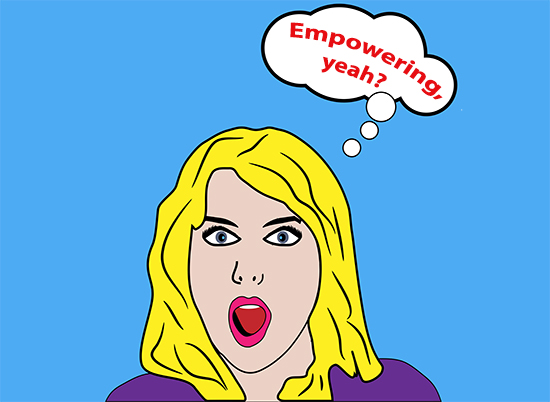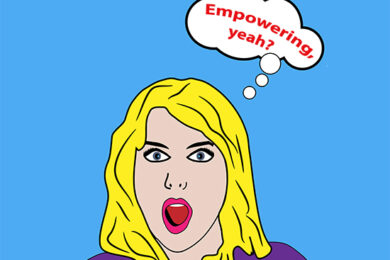Recently, I went to interview a mid-tier pop star in one of those anonymous hotel rooms where the coffee is bad and the WiFi never seems to work. Jet-lagged and uncaffeinated, my pop star was not on voluble form. Although I had prepared for the interview thoroughly, a monosyllabic interviewee is pretty much every journalist’s anxiety dream… so I just lobbed it in, the ultimate question to be asked when all the other questions have been asked, but you’ve got time to kill. Arghhhh, I croaked, what political message are you making in your work?
A froideur settled on the room. The pop star sat forward. In professionally courteous tones, she explained that her music wasn’t political, because she wasn’t political, and could we kindly discuss something else. I don’t even remember the rest of the interview, but I do remember how I felt when I left: flustered, silly, and hot.
Asking a pop star about the political message in their work is the equivalent of asking a nine-year-old which Little Mix song they like best, or a Valley girl whether Pinkberry or Yogurtland is creamier. It’s the premier journalistic non-question of our age. It’s conversational Polyfill. So, why did I ask it?
Because that’s just what you do, these days. Pop stars these days are political. They leave messages in their work. They empower their fans, ideally whilst simultaneously selling them tour tickets and merch that may or may not be ethically produced. They’re artist-activist hybrids, raising political consciousnesses with every pelvic thrust and heartfelt Instagram post.
In the last few months, I’ve received hundreds of emails about “empowering” artists to my inbox. (Luke, my editor at the Quietus, actually counted his: 1,426 last year, and still they come.) Because pop stars today are PR-managed, most of the time, it’s unclear what they’re actually advocating for. Usually they want to raise awareness of one issue, or break the silence on another. Most of the time, any radical message they might have had has been laundered by a team of PR professionals more thoroughly than a Mafia-backed accountancy firm.
My issue isn’t with musicians being political. Some of my favourite musicians have incorporated political messages into their work. Madonna’s fight against slut-shaming. Sinead O’Connor’s stance on the Catholic Church. Lady GaGa’s campaigning on sexual violence, as a survivor herself. Eminem’s storming anti-Trump freestyle; Stormzy’s passionate Grenfell protest at last year’s Brits.
All of these artists had skin in the game, and something to lose by making a political stance. GaGa exposed her private trauma for the world to see. Eminem alienated his own fanbase with his anti-Trump stance. Stormzy exposed himself to the racially-tinged abuse of the UK’s right-wing media. They were bold, brave stances that succeeded in putting powerful issues on the public agenda.
My issue is with pop stars being sort of political, but not really, to generate column inches and press in our socially-conscious times. Everywhere I look, I see artists performing wokeness in an insincere attempt to appear relevant. When political consciousness-raising becomes a marketing gimmick, we all suffer. Reducing important social movements like feminism or mental health awareness to a trendy aesthetic for pop stars to co-opt undermines the cause. When activism becomes used as marketing jargon, it devalues the real and sincere efforts of activists the world over to make the world a better, fairer, less awful place. Feminism isn’t a marketing tool: mental health activism goes beyond posting a selfie on Instagram.
Some people reading this will say, isn’t any awareness better than none? No, for talking out about inequality and injustice achieves scant little, if it’s not accompanied by action. A thousand pop stars making vague references to ill-defined struggles with anxiety in PR-managed magazine interviews won’t fix the NHS. Writing to your MP might.
Plus, pop stars tend to be in the business of selling things: tour tickets, merch, perfume – even records, once upon a time. Social movements are by definition anti-capitalist: capitalism rots activism faster than teeth in a glass of Coca-Cola. After all, feminism isn’t a product you can buy in a store, and a self-care branded candle won’t fix the gender pay gap. As much as pop music is entertainment, it’s also a product. And when social movements are used to sell us things, we cannibalise them. Capitalism demands novelty: the endless drive towards the shiny and new. Remember when we all stanned male-fronted guitar bands? Trends go in cycles, meaning they come in and out of fashion again. Eventually, the movement becomes unfashionable; consumers move on; pop stars find new things to talk about. Who loses? We do.
We’re currently living in exceptionally gnarly times, although it’s worth remembering that for many – people of colour, those on low-incomes, and LGBTQ communities – things have always been tough. In times like these, pop music is a necessary respite. Last year I watched the Kavanaugh hearings all the way through instead of working, because I felt like I should. Afterwards, I felt red raw, like Kavanaugh himself had lunged through my screen and slapped me in the face. I slammed my computer shut and walked home with Robyn’s Honey playing in my ears. This was pop music as pure escape: music that spills and pools around you in a syrupy embrace. It also wasn’t — blessedly — political. I turned to Robyn when I needed a break from the robust awfulness of our contemporary political discourse, and she spooned honey into my ear.
By this I mean to say that pop doesn’t have to be embrace politics in order to have meaning. Artists don’t have to speak in half-slogans and pseudo-activist speak to get my support. All I require of my pop stars is that they have catchy hooks, and better cheekbones than me. Pop stars: be political, or don’t be political. Just please, please don’t be somewhere in between.



